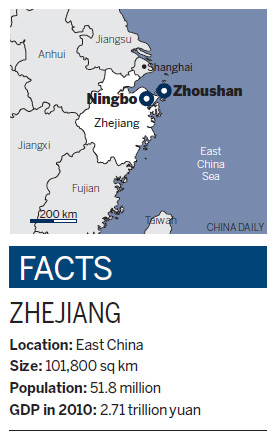New wave
Updated: 2011-05-06 12:48
By Zhao Yanrong and Zhang Jianmin (China Daily European Weekly)
 |
Coastal city banks on marine sector to ride next stage of economic development
In early spring, winds from the East China Sea moisten the trees and flowers of Zhejiang province. Around the provincial capital Hangzhou, lush camphor trees bloom and give out their distinctive scent. But for Guo Jianbiao, head of Zhejiang's transportation department, it is the business opportunity in the ocean air that is alluring.
Zhejiang is one of the smallest provinces in China, with about 101,800 sq km of land that make up slightly more than 1 percent of China's total land area. Mountainous areas make up about 70 percent of the limited space, while not more than 21,000 sq km is farmland.
Guo, 53, chooses to see the province's advantages instead.
"The ocean and ports here actually form the largest economic resources in Zhejiang, equaling the oil and mining areas in other inland provinces," he says.
When Guo became the mayor of Zhoushan city in Zhejiang in early 2003, the local economy was looking for ways out of a rut. Specialized markets such as the household electrical appliances, toys and textile industries had matured over two decades in the province.
|
|
As the only prefecture-level city consisting solely of islands in China, Zhoushan had planned to follow the developed economic models in other Zhejiang cities. But Guo believed that the local economy should rely on local resources.
"If you live on a mountain, you live off the mountain; if you live by the water, you live off the water," Guo says.
"For the Zhoushan islands and even Zhejiang, we should live off the ocean resources."
Marine businesses in Zhoushan were generally overlooked in the past because of the area's strategic location for the military. But in his first year in office, Guo invited many senior officials from more than 10 counties to a fair on the global marine economy in Hong Kong.
A single exhibition booth cost more than 1 million yuan (104,000 euros) back then, but the $200 billion (135 billion euros) sector was too good to pass over.
"Many years ago, I had already noticed that the marine industry was the modern economy, the global economy," he says.
"We need an international platform to tap the potential of our ocean economy."
For the past decade, harbor industries including shipbuilding, fishery products processing and petrochemicals have become the new growth engines for Zhoushan.
In 2010, up to 77.5 percent of local industrial output totaling 92.8 billion yuan - an increase of about 21.5 percent from 2009 - came from the harbor industry. The sector almost quadrupled in five years.
As such, the potential of the marine industry along China's coastline has continued to attract attention amid the challenges posed by the country's limited land resources.
The State Council approved a plan to set up a marine economy development zone in Zhejiang on March 1, following the approval of the first such zone in Shandong province on Feb 18.
Similar plans are also under way for Guangdong province.
China has 3 million sq km of offshore waters and 32,000 kilometers of coastline, offering at least 24.6 billion tons ocean oil reserves and 1.6 billion cubic meters of natural gas reserves. The ocean economy accounts for almost 10 percent of the nation's GDP, supporting more than 32 million jobs, Xinhua News Agency reported.
Based on proposals for the country's 12th Five-Year Plan (2011-2015) released in October last year, the government will strengthen development of the marine economy over the next five years.
Zhejiang itself has abundant reserves of oil, natural gas and undeveloped small islands. The province holds 30.7 percent of China's total coastline, ranking first for such resources in China and more than 2,800 offshore islands, as well as accounting for 40 percent of the country's total.
E-paper

Tapping into the future
Foreign companies are investing in China's water industry as many predict a growing profit margin.
Headhunters ride on growth
Commercial property rides wave
Learning from the past
Specials

Cuisine central
London's Chinatown is helping diners appreciate full palate of Chinese food

Tying the knot
Danish couple's high-end macrame export business takes off in the mountains of Yunnan.

Truly a super woman
Li Yuchun first came to prominence in 2005 as the Super Girl winner, and since then has become an international star.

